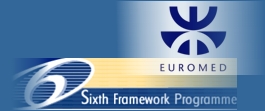

Project Implementation
The Go-EuroMed project is designed to be implemented in 3 stages over a period of 36
months.
Stage 1: The Political Economy of Governance in the Euro-
Mediterranean Partnership
Stage 1 will be directed towards improving academic and policy literature concerning the
political economy of governance in the Euro-Mediterranean Partnership, with the
intention of identifying the key areas in which the Barcelona Process can better serve the
interests of governments and the needs of citizens. Research will focus on theoretical and
empirical analysis of governance issues concerning trade, investment and labour
relationships between the EU and south Mediterranean countries. The relationships
between these economic institutions and the EMP’s security and sociopolitical goals will
be investigated, as will the negotiation processes through which outcomes are reached.
Stage 2: New Challenges
What are the key challenges that the Euro-Mediterranean partnership will face during the
next decade? How can the EU and Mediterranean Partner Countries deal with these
challenges in order that the Barcelona Process achieves more success in its second
decade than in its first? These are the main questions that GO-EuroMed partners will
address in the project’s second phase. Five working packages have been designed which
deal with the most important challenges ahead: ‘EU Enlargement’, ‘Domestic Reform in
Mediterranean Partner Countries’, ‘Regional Integration in the MENA’, ‘Demography,
Migration and Culture’ and ‘Geopolitical Change’.
Stage 3: Institutional Strategies
The project’s main objective is to improve scientific and policy level understanding of
institutional governance strategies under the Euro-Med Partnership. This entails
conducting detailed analysis of institution building and management mechanisms, and
testing these models against various legitimacy and efficiency standards. The goal is to
identify strategies capable of providing concrete benefits to governments and peoples on
both sides of the Mediterranean Sea. For analytical as well as policy reasons, working
packages are built around three interlinked institutional settings: domestic, bilateral and
multilateral institutions.
|

